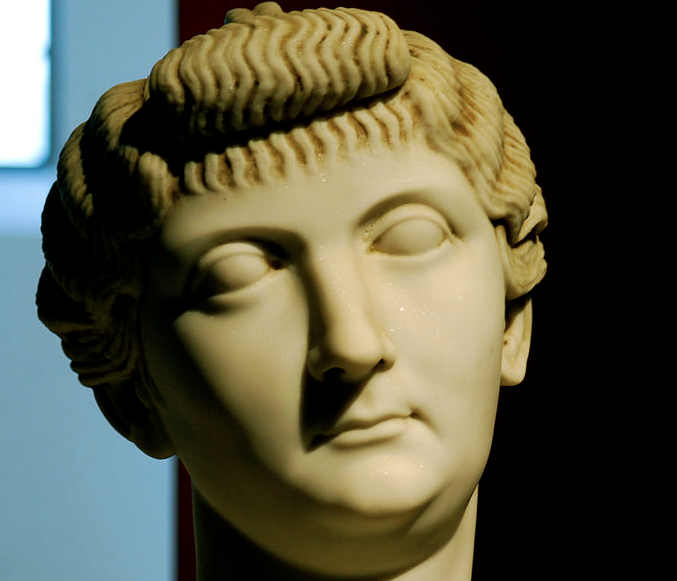The political role of women of the Roman elite, with particular attention to the autonomy and influence of the Julio-Claudian women, 44 BCE to CE 68
By Ilona Zager
Master’s Thesis, University of South Africa, 2014

Abstract: Many accounts, both ancient and modern, have maintained that the Julio-Claudian women had unprecedented influence in their spheres. This dissertation attempts to determine the degree of autonomy and influence that the Julio-Claudian women had and to examine the factors that may have contributed to their exceptional influence.
In trying to establish the extent and nature of the influence of the Julio-Claudian women, the ancient sources (literary, documentary and iconographic), in conjunction with modern scholarly views, were critically examined throughout. In attempting to determine the factors that influenced such weight and autonomy as these women had, the dissertation looks at the influences on women of earlier times, in particular the late Roman Republic, from a legal and a socio-historical angle. Whether the Julio-Claudian women could be considered, for example, to have been part of a “super-elite” in comparison with aristocratic women of earlier, and even later, times, was discussed and evaluated.
On the surface the Julio-Claudian women did seem to enjoy a wider range of freedoms, power and influence than their counterparts, or the Roman women before or after them. Yet it is clear from the sources that these women also had restrictions laid upon them and that the patriarchal framework still curtailed their influence. When they over-stepped the accepted bounds, they were invariably vilified by the ancient historians, and often came to be negatively portrayed by subsequent generations. Whether these women truly deserved their vilification, or whether it can simply be ascribed to the bias of the ancient writers, was also explored throughout.


 Excerpt: The Julio-Claudian women seem to have been among the most controversial women in the ancient world and certainly the most-mentioned by the ancient historians of the Early Empire. The sources providing information about the lives of these women are at best biased, mostly giving a negative picture of their characters and actions. The examination of the available literary evidence (of varying quality and usefulness in their provision of information) will help to determine the impact the transformation of the Roman world under Augustus had on the roles of the Julio-Claudian women.
Excerpt: The Julio-Claudian women seem to have been among the most controversial women in the ancient world and certainly the most-mentioned by the ancient historians of the Early Empire. The sources providing information about the lives of these women are at best biased, mostly giving a negative picture of their characters and actions. The examination of the available literary evidence (of varying quality and usefulness in their provision of information) will help to determine the impact the transformation of the Roman world under Augustus had on the roles of the Julio-Claudian women.
The first problem we encounter when we study the history of the ancient Romans, is that we have only scraps left of the histories and literature that were written in antiquity. Especially where it concerns women, the literature of the period yield little, yet what they yield is of utmost importance and provides us with the best information we have.45 In studies of the imperial family in this period, three writers are prominent: Tacitus, Suetonius and Cassius Dio, each with a different approach. Tacitus and Dio wrote in a narrative framework, and in an analytical format. Suetonius wrote biographies, not histories; the difference in genre is significant, but the opinions expressed by the authors represent the most dramatic divergence.
Click here to read this thesis from the University of South Africa
Sponsored Content


The political role of women of the Roman elite, with particular attention to the autonomy and influence of the Julio-Claudian women, 44 BCE to CE 68
By Ilona Zager
Master’s Thesis, University of South Africa, 2014
Abstract: Many accounts, both ancient and modern, have maintained that the Julio-Claudian women had unprecedented influence in their spheres. This dissertation attempts to determine the degree of autonomy and influence that the Julio-Claudian women had and to examine the factors that may have contributed to their exceptional influence.
In trying to establish the extent and nature of the influence of the Julio-Claudian women, the ancient sources (literary, documentary and iconographic), in conjunction with modern scholarly views, were critically examined throughout. In attempting to determine the factors that influenced such weight and autonomy as these women had, the dissertation looks at the influences on women of earlier times, in particular the late Roman Republic, from a legal and a socio-historical angle. Whether the Julio-Claudian women could be considered, for example, to have been part of a “super-elite” in comparison with aristocratic women of earlier, and even later, times, was discussed and evaluated.
On the surface the Julio-Claudian women did seem to enjoy a wider range of freedoms, power and influence than their counterparts, or the Roman women before or after them. Yet it is clear from the sources that these women also had restrictions laid upon them and that the patriarchal framework still curtailed their influence. When they over-stepped the accepted bounds, they were invariably vilified by the ancient historians, and often came to be negatively portrayed by subsequent generations. Whether these women truly deserved their vilification, or whether it can simply be ascribed to the bias of the ancient writers, was also explored throughout.
The first problem we encounter when we study the history of the ancient Romans, is that we have only scraps left of the histories and literature that were written in antiquity. Especially where it concerns women, the literature of the period yield little, yet what they yield is of utmost importance and provides us with the best information we have.45 In studies of the imperial family in this period, three writers are prominent: Tacitus, Suetonius and Cassius Dio, each with a different approach. Tacitus and Dio wrote in a narrative framework, and in an analytical format. Suetonius wrote biographies, not histories; the difference in genre is significant, but the opinions expressed by the authors represent the most dramatic divergence.
Click here to read this thesis from the University of South Africa
Sponsored Content